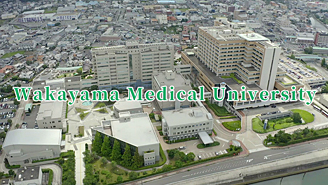Supporting the Community and Challenging the World: a comprehensive medical university that builds the future of medicine
Wakayama Medical University is now in its third year of comprising three faculties: The School of Medicine, the School of Pharmaceutical Sciences, and the School of Health and Nursing Science. It has established its own value of existence, it continues to challenge and to grow, and it has the mission and responsibility to contribute to the development of medical care and to society. I would like to share thoughts on the following, all of which will serve as the foundation for Wakayama Medical University to make great strides toward the future: I: Management of the corporate organization, II: Human resource development, III: Research revitalization, and IV: Functions of the affiliated hospitals and contribution to regional medical care.
I. Corporate Organization and Management
1. Social Contribution
In addition to its contribution to local medical care, another important function of the University is its role as a public institution of society through its contribution to regional development and the revitalization of the local economy. (1) Supporting activities for companies in Wakayama Prefecture: The University will support corporate activities from an academic standpoint by assisting researchers from companies in Wakayama Prefecture to obtain master's and doctoral degrees and by strengthening cooperation with industry and business. (2) Becoming the core of regional revitalization: We will contribute to the revitalization of the regional economy by adjusting the flow of people starting from the university. In each faculty, we will secure a certain level of in-prefecture enrollment to nurture individuals who can play a role in regional revitalization through medical activities.
2. Internationalization and Global Development
As a university, globalization is inevitable. As a corporation, we will promote international academic exchange and joint research, and nurture individuals who have an international perspective and can play an active role on the international stage. We will build a global network by actively embracing international students and engaging in international cooperation projects.
3. Establishment of information infrastructure and DX promotion
To improve efficiency, we will functionally integrate the hospital's medical information department, including electronic medical records, and the university's information management department. The information infrastructure of the library and other academic departments will be improved and VR education will be expanded from clinical practice to basic medicine and liberal arts courses. We will also develop medical information technology across the entire university and promote DX (digital transformation), such as by making affiliated hospitals 'smart hospitals' (building a hospital management analysis, diagnosis, and bed management system using AI, and a system for utilizing clinical data).
II. Human Resource Development
1. Strengthening clinical participatory training and multidisciplinary collaborative education
In the three faculties of the School of Medicine, the School of Heath and Nursing Science, and the School of Pharmaceutical Sciences, we will place greater emphasis on clinical training in the field, and expand and strengthen programs to cultivate practical skills and teamwork. Collaboration with local medical institutions will be strengthened to provide experience in actual medical settings.
2. Fostering medical personnel who will play a leading role in community medicine
The University will become a center for fostering talented and mission-minded doctors, pharmacists, and nurses who will play a leading role in the future of community medicine in Wakayama Prefecture. As a first step, we will expand community-minded education before graduation. Then, after graduation, we will build an attractive and fulfilling training program for residents, centered on the Postgraduate Clinical Training Center and in cooperation and collaboration with other departments, and with the aim to accept more initial clinical trainees and residents as majors. We will also support the postgraduate career development of those who have graduated from the prefectural resident and community medicine programs of the School of Medicine and the prefectural programs of the School of Pharmaceutical Sciences, and establish a system that enables them to engage in community medicine with a global perspective and with motivation.
III. Research Activation
1. Promoting cross-faculty and diverse research fields
We will embrace diversity in research fields, and create an environment that allows students to engage in a wide range of fields, from basic research to clinical research. With the establishment of the Graduate School of Medicine and Pharmaceutical Sciences in April 2024, we will encourage interdisciplinary projects and joint research, and create a system to provide financial support for innovative research projects that explore new perspectives. Through the revitalization of research, we will strengthen cooperation between the School of Medicine, the School of Pharmaceutical Sciences, and the School of Health and Nursing Science, and further enhance exchange of personnel between them.
2. Establishment of an infrastructure for utilization of medical data
We will promote medical data science by creating an environment that enables easy utilization of medical information. Aiming to revitalize translational research, we will promote biobank projects with databases that link specimen collection and medical information. This includes the introduction into electronic medical records of FHIR, a new standard for collecting medical information from medical institutions nationwide in a common format, to enable 'big data' research.
IV. Hospital Functions and Contribution to Regional Medical Care
1. Fulfilling our responsibility as the only hospital in the prefecture with specific functions under the regional medical care plan
The regional medical care concept is being discussed between each major hospital in the prefecture and the government. Wakayama Medical University Hospital will play a central role in establishing a seamless medical care delivery system in the prefecture, from highly acute to convalescent care, by further strengthening its original function of providing highly advanced medical care while promoting close cooperation and functional sharing with regional medical institutions.
2. Community medical support using digital information and communication technology (ICT)
In the future, we will further expand ICT-based medical information collaboration and telemedicine across the local community to address regional disparities in medical care in the prefecture. In addition, in cooperation with ICT-related companies, we have already conducted demonstration experiments using drones to transport medical supplies, and in the near future drones will be used to deliver medical supplies to remote areas, such as during disasters, to provide medical support. Considering Japan's aging population, the university hospital in Wakayama Prefecture, which has already entered the super-aging society, and its efforts to support regional medical care through ICT, can serve as a model case for future regional medical care in Japan.
April 2024
Naoyuki NAKAO
President and Chairman of Wakayama Medical University
Undergraduate
- School of Medicine
- Message from the Dean of the School of Medicine
- List of Medicine
- School of Health and Nursing Science
- Message from the Dean of the Graduate School of Health and Nursing Science
- School of Pharmaceutical Sciences Scienc
- Message from the Dean of the School of Pharmaceutical Sciences











